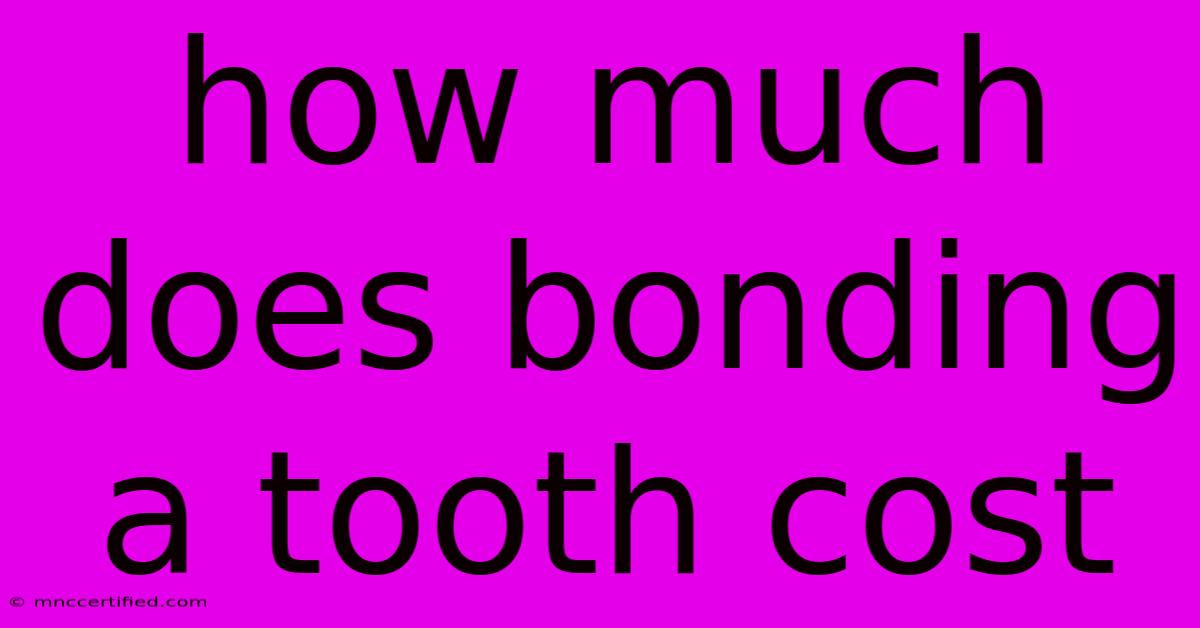How Much Does Bonding A Tooth Cost

Table of Contents
How Much Does Bonding a Tooth Cost? A Comprehensive Guide
A chipped tooth can be a real pain, both literally and figuratively. Luckily, there's a simple and affordable solution: dental bonding. This procedure uses a tooth-colored composite resin to repair chipped, cracked, or discolored teeth, giving you a beautiful, natural-looking smile. But how much does bonding a tooth cost?
This is a question with a wide range of answers, as the cost of dental bonding can vary significantly depending on several factors. Let's break down the key factors that influence the price, so you can get a better understanding of what to expect.
Factors Affecting the Cost of Dental Bonding
1. Location: Just like the price of a cup of coffee, dental costs can vary greatly depending on where you live. Large cities and areas with a higher cost of living generally have higher dental fees.
2. Complexity of the Procedure: A simple chip repair will be less expensive than a more complex procedure, like reshaping a tooth or covering a large area of discoloration.
3. Number of Teeth Bonded: The cost of bonding is usually calculated per tooth. If you need several teeth bonded, the overall cost will naturally increase.
4. Dentist's Experience and Credentials: Experienced and highly skilled dentists may charge more than those who are newer to the profession.
5. Materials Used: The type of composite resin used can also impact the cost. High-quality resins that provide a more natural look and are more resistant to staining may be more expensive.
6. Insurance Coverage: Your dental insurance plan may cover part or all of the cost of bonding. Check your plan benefits to understand what's covered.
Average Cost of Dental Bonding
It's difficult to give an exact price range, but in general, you can expect to pay anywhere from $100 to $500 per tooth for bonding.
Here's a rough estimate:
- Simple chip repair: $100 - $300 per tooth
- Reshaping a tooth: $200 - $400 per tooth
- Covering discoloration: $300 - $500 per tooth
Remember, these are just estimates. It's always best to consult with your dentist to get a personalized quote for your specific needs.
Alternatives to Bonding
If you're looking for other options, here are a few alternatives to dental bonding:
- Veneers: These thin shells of porcelain are more expensive than bonding but offer a more durable and natural-looking solution.
- Crowns: Crowns are used for more extensive damage and can be made from different materials.
It's important to discuss your options with your dentist to determine the best solution for your individual needs and budget.
Getting the Most Out of Your Bonding
While bonding can be a great way to repair damaged teeth, it's important to understand that it's not a permanent solution. With proper care, bonding can last for several years.
Here are some tips for maximizing the longevity of your dental bonding:
- Avoid staining foods and drinks: Coffee, tea, red wine, and other staining substances can discolor the bonding.
- Brush and floss regularly: Good oral hygiene is essential for keeping your bonding healthy.
- See your dentist for regular checkups: Your dentist can monitor the condition of your bonding and make sure it's still in good shape.
Conclusion
Dental bonding is a cost-effective and aesthetically pleasing solution for a variety of dental problems. By understanding the factors that influence the cost and getting an accurate quote from your dentist, you can make an informed decision about whether bonding is the right choice for you.

Thank you for visiting our website wich cover about How Much Does Bonding A Tooth Cost. We hope the information provided has been useful to you. Feel free to contact us if you have any questions or need further assistance. See you next time and dont miss to bookmark.
Featured Posts
-
Spadaros 26 18 Win Analysis And Takeaways
Nov 15, 2024
-
Commanders Eagles Tnf Key Matchups And Predictions
Nov 15, 2024
-
Paraguay Vs Argentina Lineups Starting Xi
Nov 15, 2024
-
Belvedere Trading Online Assessment
Nov 15, 2024
-
Fisher Investments Retirement Guide
Nov 15, 2024